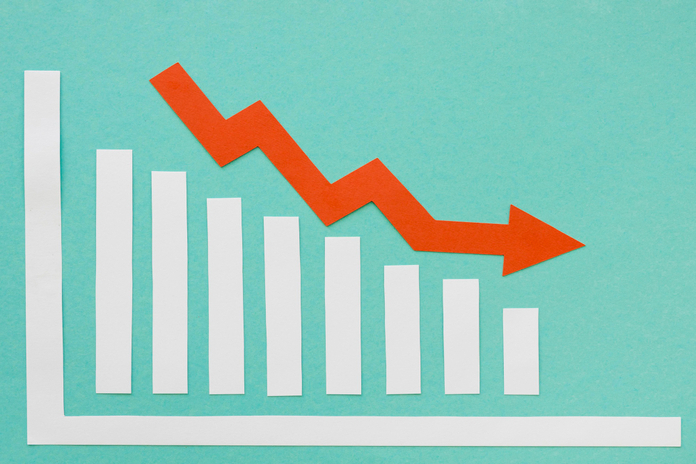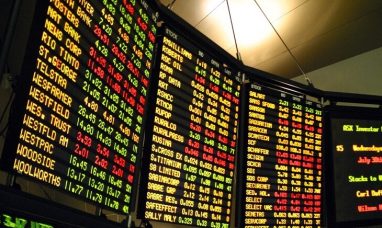The stock market decline intensified on Tuesday as Wall Street reacted to weaker-than-expected economic data. Investors remain on edge as uncertainty looms over potential tariff announcements from President Donald Trump, expected on Wednesday.
The S&P 500 dropped 0.8% in early trading, while the Dow Jones Industrial Average (DJIA) plunged 459 points, or 1.1%. The Nasdaq Composite also slid 0.6%, reflecting widespread investor concerns.
U.S. Manufacturing Contracts Amid Trade War Pressures
Treasury yields dipped following a report indicating a contraction in U.S. manufacturing activity, breaking a two-month streak of growth. Another report revealed that job openings fell slightly below expectations, further fueling concerns about a slowing economy.
Several companies have reported feeling the impact of trade tensions. The Institute for Supply Management noted that anxiety over tariffs has led customers to scale back orders. One electronics manufacturer cited growing concerns over pricing pressures, while a food and beverage producer warned that Canadian consumers may begin boycotting U.S. products in response to ongoing trade disputes.
Market Volatility Driven by Tariff Uncertainty
Wall Street has experienced heightened volatility, with market momentum swinging rapidly as investors attempt to gauge the economic consequences of new tariffs. Even if Trump announces milder-than-expected trade restrictions, the unpredictable nature of U.S. trade policy may discourage business investment and consumer spending, further dampening economic growth.
Despite these concerns, the labor market remains relatively stable. However, the latest job openings data suggest that hiring could be slowing. Investors worry that prolonged uncertainty may push businesses and consumers to adopt a more cautious stance, impacting overall economic activity.
Gold Prices Surge as Investors Seek Safe Haven
The ongoing Wall Street decline has driven investors toward safe-haven assets like gold. Prices briefly exceeded $3,175 per ounce, continuing their upward trajectory from under $2,700 at the start of the year. The rise underscores growing fears about inflation and economic instability.
Corporate Reactions and Notable Stock Movements
Among individual stocks, Johnson & Johnson (NYSE:JNJ) saw a steep 4.9% decline after a U.S. bankruptcy court rejected its latest settlement proposal related to talc-containing baby powder lawsuits. This marks the third time the company’s efforts to resolve claims through bankruptcy proceedings have been denied.
Meanwhile, airline stocks continued their downward slide as economic uncertainties and trade tensions raise concerns about future travel demand. Delta Air Lines (NYSE:DAL) and United Airlines (NASDAQ:UAL) both dropped 6.1% as investors reassessed the outlook for the airline industry.
On the positive side, PVH Corp (NYSE:PVH) surged 16.6% after the company behind Calvin Klein and Tommy Hilfiger reported stronger-than-expected quarterly earnings. PVH also announced plans to return $500 billion to shareholders through stock buybacks this year, boosting investor confidence.
Global Markets Show Mixed Reactions
International stock markets showed mixed results. In Europe, the DAX in Germany rose 1%, while France’s CAC 40 gained 0.6%. European Commission President Ursula von der Leyen emphasized that the European Union would not be intimidated by U.S. trade threats, suggesting that countermeasures were on the table.
In Asia, Japan’s Nikkei 225 remained steady as Prime Minister Shigeru Ishiba urged the U.S. to reconsider higher auto tariffs on Japanese imports. A central bank survey also indicated a decline in business sentiment among Japan’s major manufacturers.
Bond Yields Fall as Economic Worries Mount
The yield on the 10-year Treasury dropped to 4.13%, down from 4.23% on Monday and significantly lower than the 4.80% peak in January. Falling bond yields often signal growing concerns about a slowing economy, as investors shift toward safer assets.
Conclusion
The stock market decline reflects deepening investor concerns over trade tensions, economic data, and corporate earnings. While uncertainty remains high, upcoming tariff announcements could further shape market sentiment in the days ahead. Investors are bracing for continued volatility as Wall Street navigates the economic and geopolitical challenges ahead.
Featured Image: Freepik








